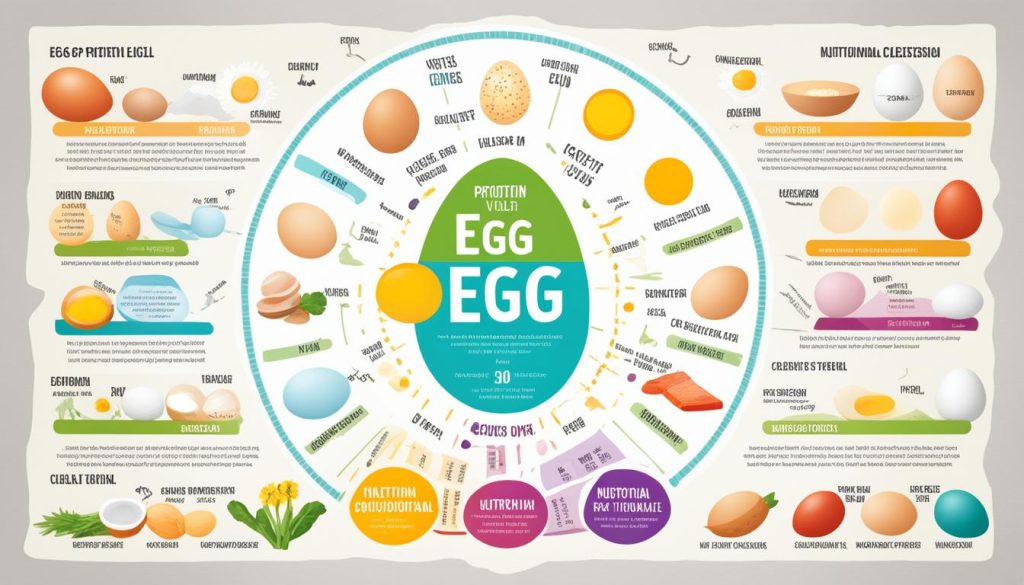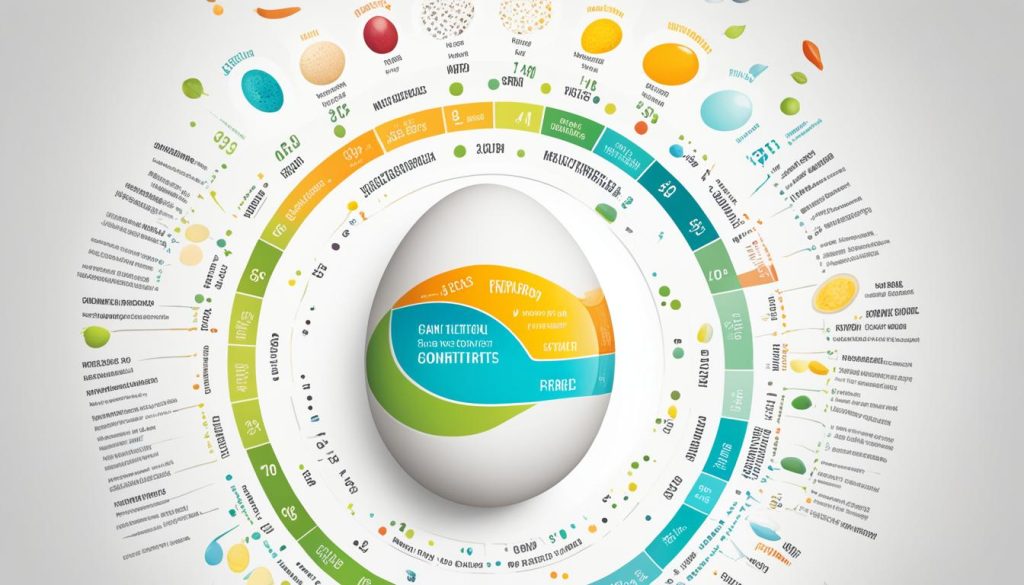Are you curious about the protein content in eggs? Well, you’ve come to the right place. Eggs are not only delicious but also packed with essential nutrients. One key nutrient that eggs provide is protein. Let’s dive into the nutritional facts and discover how much protein in an egg.
Whether you enjoy your eggs raw or cooked, the protein amount remains the same. However, it’s vital to note that consuming raw eggs poses a risk of Salmonella bacteria infection, so it’s recommended to cook eggs thoroughly before consumption.
Protein isn’t the only nutrient eggs offer. They are also rich in vitamins and minerals. Eggs contain choline, iron, vitamin B12, and vitamin D, which contribute to overall health and well-being.
Incorporating eggs into your diet can be a great way to ensure you’re getting the protein and other valuable nutrients your body needs. So why not make eggs a staple in your daily meals? You’ll not only enjoy a tasty and versatile ingredient but also reap the nutritional benefits.
How Much Protein in an Egg?
The protein content of eggs is distributed between the egg white and yolk. The egg white, consisting of approximately 88% water, contains about 3.6 grams of protein per 33 grams of raw egg white. Whereas the yolk, known for its abundance of nutrients and fat, contributes about 2.7 grams of protein to a large egg containing a total of approximately 6.3 grams of protein. It is worth mentioning that while both parts of the egg contain protein, the egg white has a slightly higher protein content.
When it comes to the distribution of protein in eggs, the egg white takes the lead. With its smooth and transparent appearance, the egg white, also known as the albumen, contains a significant amount of egg white protein. Approximately 88% water, the egg white holds about 3.6 grams of protein per 33 grams of raw egg white, making it a valuable source of this essential nutrient.
On the other hand, the nutrient-rich yolk, with its vibrant yellow color, plays an integral role in the overall protein content of an egg. While it may have a lower protein content compared to the egg white, contributing around 2.7 grams of protein, the yolk is packed with various nutrients and fats that provide additional benefits beyond protein. It is essential to note that the yolk possesses a slightly higher fat content compared to the egg white. However, its inclusion in the diet offers a range of important vitamins and minerals that support overall health.
Nutritional Benefits of Eggs
Eggs offer various nutritional benefits beyond their protein content. In addition to being a protein powerhouse, eggs are relatively low in calories, making them a healthy choice for those watching their calorie intake. With just about 71 calories, one large raw egg provides a wealth of essential nutrients.
Eggs are a balanced source of vitamins and minerals, including vitamins A, B12, D, E, folate, iron, lutein, zeaxanthin, and selenium. These nutrients contribute to overall health and wellbeing, supporting various bodily functions.
Eating eggs has been linked to weight loss and weight maintenance, thanks to their ability to promote feelings of fullness and satiety. Including eggs in your diet can help you stay satisfied and curb cravings between meals.
Eggs also offer benefits for cardiovascular health. Studies have suggested that consuming eggs may reduce the risk of cardiovascular disease and stroke. The antioxidants present in eggs, such as lutein and zeaxanthin, contribute to these protective effects.
The yolk of an egg deserves special mention due to its richness in nutrients. It contains essential substances like choline, which plays a crucial role in brain development, metabolism, and gene expression. Choline is particularly important for pregnant women to support the healthy development of the baby’s brain.

Eggs and Cholesterol
Eggs have often been criticized for their cholesterol content. One large hard-boiled egg contains 212 mg of cholesterol, which is 71% of the recommended daily allowance. However, recent research shows that dietary cholesterol from eggs does not significantly affect blood cholesterol levels in most people. In fact, eggs may improve levels of “good” HDL cholesterol. While eggs can be enjoyed as part of a healthy diet, people with diabetes should be cautious as consuming seven eggs per week may increase their risk of heart disease.

Despite concerns about cholesterol, eggs can still be a valuable addition to your diet. The cholesterol content in eggs has less impact on blood cholesterol levels than previously believed. In fact, the focus on cholesterol in eggs may overshadow their many nutritional benefits. Eggs are rich in essential nutrients, such as vitamins A, B12, and D, as well as minerals like choline and iron.
Research suggests that dietary cholesterol has a limited effect on blood cholesterol levels for most people. The rise in cholesterol from consuming eggs is generally balanced by an increase in the “good” HDL cholesterol, resulting in a neutral overall effect on cholesterol ratios. However, it’s important to note that individuals with diabetes should exercise caution when consuming eggs as part of their diet. Limiting egg consumption to the recommended intake can help manage the risk of heart disease.
Overall, eggs can be enjoyed moderately as part of a healthy, balanced diet. In addition to their protein content, eggs offer a range of nutrients that support overall health and well-being. So go ahead, enjoy your eggs guilt-free and reap the benefits they bring to the table!
Eggs and Brain & Eye Health
Eggs provide essential nutrients that support brain and eye health. Choline, found primarily in the yolk, is essential for maintaining a healthy nervous system and promoting brain development and memory. Lutein and zeaxanthin, also found in the yolk, help protect against age-related macular degeneration and cataracts. These antioxidants can also shield the eyes from blue light. Including eggs in your diet can ensure adequate intake of these nutrients.

When it comes to promoting brain health, eggs are a valuable source of choline. Choline plays a crucial role in various brain functions, such as memory and cognition. It is particularly important during pregnancy and early childhood, as it supports the development of the nervous system.
Furthermore, the yolk of an egg contains lutein and zeaxanthin, two nutrients that are beneficial for eye health. These antioxidants help protect the retina from oxidative stress and reduce the risk of age-related macular degeneration and cataracts.
Incorporating eggs into your diet can provide the necessary nutrients for optimal brain and eye health. Whether enjoyed as a simple boiled egg, scrambled, or incorporated into various recipes, eggs offer a convenient and nutritious way to support your overall well-being.
Different Ways to Prepare Eggs
Eggs can be prepared in various ways, each offering a unique calorie and nutrient profile. Here are some popular methods:
1. Hard-Boiled Eggs

Hard-boiled eggs are a classic choice for a quick and easy protein-rich snack. They provide approximately 77 calories and contain about 6.3 grams of protein per egg. Hard-boiling eggs involves boiling them until the yolk and white are both fully cooked.
2. Poached Eggs
Poached eggs are cooked in water without any additional fats. This method is popular for its simplicity and healthiness. A poached egg has around 74 calories and offers a good source of protein. To poach an egg, it is gently cooked in simmering water until the egg white is set and the yolk is still slightly runny.
3. Fried and Scrambled Eggs
Fried and scrambled eggs are delicious options, but they tend to have a higher calorie content due to the addition of fats such as oil or butter. The specific calorie content varies depending on the amount and type of fats used for cooking. Nevertheless, these cooking methods allow for versatility and can be enjoyed in different ways, such as adding vegetables or cheese.
Remember, when preparing eggs, it’s essential to consider your personal taste preferences, dietary needs, and any specific health goals you may have. Experiment with different cooking techniques to discover your favourite way to enjoy eggs while savouring their high protein content.
Conclusion
Eggs are a protein powerhouse, with an average-sized egg containing 6–7 grams of protein. Both the egg white and yolk contribute to the protein content, with the egg white slightly higher in protein content. In addition to protein, eggs offer various vitamins and minerals that support overall health. While the cholesterol content in eggs has been a concern, recent research suggests that dietary cholesterol from eggs does not significantly impact blood cholesterol levels. Eggs provide essential nutrients for brain and eye health and can be enjoyed in different ways. Incorporating eggs into a balanced diet can contribute to meeting your daily protein needs while providing other valuable nutrients.
FAQs
How much protein is in an egg?
On average, an egg contains about 6–7 grams of protein.
Where is the protein content in an egg?
The protein content is distributed between the egg white and yolk, with the egg white slightly higher in protein content.
What are the nutritional benefits of eggs?
Eggs offer various vitamins and minerals, including choline, iron, vitamin B12, and vitamin D, and have been linked to weight loss, cardiovascular health, and brain development.
Do eggs contain cholesterol?
Yes, eggs contain cholesterol, but dietary cholesterol from eggs does not significantly affect blood cholesterol levels in most people.
How do eggs support brain and eye health?
Eggs provide nutrients such as choline, lutein, and zeaxanthin, which are essential for brain development and memory, and help protect against age-related macular degeneration and cataracts.
What are different ways to prepare eggs?
Eggs can be prepared in various ways, including hard-boiled, poached, fried, and scrambled.
Are eggs a high protein food?
Yes, eggs are a high protein food, with an average-sized egg containing 6–7 grams of protein.

